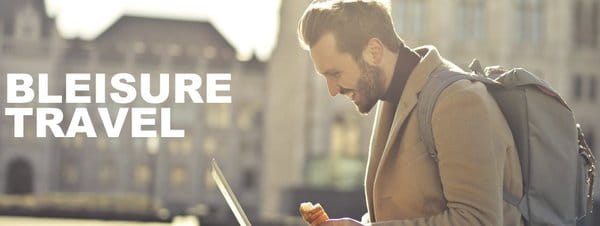MIXING BUSINESS WITH PLEASURE: BLEISURE TRAVEL
Sydney
Regional bleisure travel trends study results
Bleisure travel, adding a leisure portion of travel to a business trip, is becoming a popular way to make the most out of business travel, with 68% of business travellers globally taking at least one bleisure trip per year1.

To further explore the impacts of this trend on the Australasia region, International SOS and CAPA – Centre for Aviation (CAPA) recently conducted a regional survey of 106 Australia and New Zealand organisations regarding their views on bleisure travel.
Key Survey Findings
- Nine out of 10 people believe the responsibility for the leisure portion of business travel falls to the traveller
- One in four organisations have not considered bleisure in their travel policy
- Of the six in 10 organisations that allow bleisure, only two look into the risk rating of the leisure travel destination before approving
- One in four bleisure trips include an aspect of adventure or exploration
- Senior executives and managers are most likely to add leisure travel to a business trip
Who Holds the Responsibility of Bleisure Travel
“Bleisure is something that many companies allow, and perhaps feel they have to do in return for the long hours and intensity business travel can often incur. Quite frequently there is much less consideration given to the issues of Duty of Care, the extent to which that applies, and what companies are doing to mitigate the risks that come with bleisure,” said Peter Harbison, Executive Chairman at CAPA. “The fact is, this is a legal and insurance minefield.”
Despite the overwhelming majority (91%) of people believing the responsibility for the leisure portion of business travel falls to the traveller, organisations need to understand the potential risks they face regarding bleisure travel.
“While there is a Duty of Care during employment, often there is not a clear line on when that Duty of Care is no longer applicable,” said Tim Ainsworth, Partner at HWL Ebsworth Lawyers. “You might think that when someone has gone on the holiday portion of their trip that they are no longer in the course of their employment. However, due to corporate policies or a sense that there might be an inducement or encouragement from the employer to engage in the leisure activity, it’s not quite so black and white.”
Creating the Company’s Bleisure Travel Policy
An organisation’s encouragement and travel policy needs to align in a way that clearly states when and how they are willing to support bleisure travel.
For those who have not determined their stance on bleisure travel, it’s important to understand the decision is not a simple yes or no statement. Many stakeholders need to be involved in the decision process, including HR, insurance, risk management and legal departments.
“In our experience, many companies’ current travel policies talk from a financial or insurance perspective. What we like to see is a strong inclusion of a risk-based approach as well. This enables travellers and managers to make a risk-based decision about where and when they’re sending people overseas,” said Sally Napper, Regional Security Director – Australasia at International SOS.
Understanding Destination and Activity Risks
Understanding destination and activity risks is an often overlooked aspect of bleisure travel approval. Only 37% of organisations that allow bleisure travel look into the risk rating of the leisure travel destination before approving the leisure portion2. Along with the wide variety of global destination risks, activities vary on the risk spectrum as well. A quarter of bleisure trips include an aspect of adventure or exploration, which most likely changes the risk accepted in the business portion of the trip.
“A new location or activity can dramatically change the risk exposure in a trip,” said Kelvin Wu, Group Senior Manager, Risk Management & Insurance at International SOS. “Companies need to clearly communicate that these risks picked up by the employee on their own accord during the leisure portion of their travel might not be covered in the Group Business Travel arrangement in terms of the insurance coverage.”
Supporting bleisure travel is one way organisations can attract and attain talent3. Updating travel policies to reflect this trend includes not only Duty of Care responsibilities but also creates a culture of care.
###
Notes to Editors
Bleisure Travel Trends 2018 Survey by International SOS and CAPA
The Bleisure Trends 2018 Survey is an International SOS and CAPA – Centre for Aviation survey conducted from 7 February to 11 March 2018, targeted to business travellers and travel risk managers. The survey findings represent the responses from 106 of Australia and New Zealand’s leading organisations.
About the International SOS Group of Companies
The International SOS Group of Companies is in the business of saving lives, protecting your global workforce from health and security threats. Wherever you are, we deliver customised health, security risk management and wellbeing solutions to fuel your growth and productivity. In the event of extreme weather, an epidemic or a security incident, we provide an immediate response providing peace of mind. Our innovative technology and medical and security expertise focus on prevention, offering real-time, actionable insights and on-the-ground quality delivery. We help protect your people, your organisation's reputation, as well as support your compliance reporting needs. By partnering with us, organisations can fulfil their Duty of Care responsibilities, while empowering business resilience, continuity and sustainability.
Founded in 1985, the International SOS Group, headquartered in London & Singapore, is trusted by 12,000 organisations, including the majority of the Fortune 500, as well as mid-size enterprises, governments, educational institutions and NGOs. 12,000 multicultural medical, security and logistics experts stand with you to provide support & assistance from over 1,000 locations in 90 countries, 24/7, 365 days.
To protect your workforce, we are at your fingertips: www.internationalsos.com
About CAPA – Centre for Aviation
Established in 1990, Sydney-based CAPA - Centre for Aviation is the leading provider of independent aviation market intelligence, analysis and data services, covering worldwide developments. Please click to find more details on CAPA Membership. CAPA runs C-level aviation and corporate travel summits in key markets around the world, bringing together the leading stakeholders of the global commercial aviation industry. Please click to find more details on CAPA Events. Understanding aviation markets is our great strength and our passion. Providing our CAPA Members, clients and partners with an unparalleled level of expertise and insight is our business.
2Bleisure Travel Trends 2018 by International SOS and CAPA – Centre for Aviation.
3Bleisure Travel Webinar: Mixing Business with Pleasure by International SOS and CAPA – Centre for Aviation.


